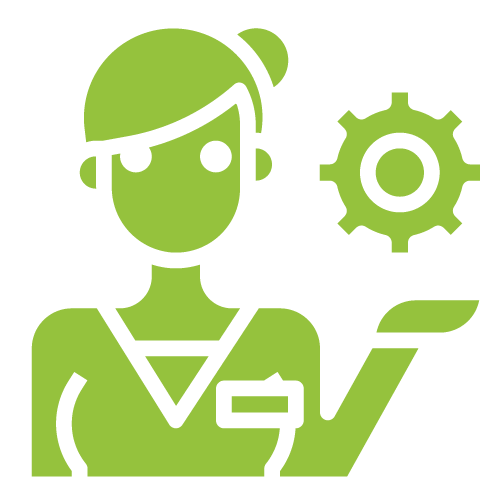

SA Youth connects young people to work and employers to a pool of entry level talent.
Are you a work-seeker?
At Harambee we are committed to keeping you safe, smart and kind. We’re producing a monthly digest of the most insightful articles on youth employment we’re reading, and have focused on the pieces we found to be most relevant and actionable. Time is scarce, so we’ve summarised the articles for you and shared our key takeaways.
NIDS-CRAM is the National Income Dynamics Study – Coronavirus Rapid Mobile Survey. The survey investigates the socioeconomic impacts of the national lockdown associated with the State of Disaster declared in South Africa in March 2020, and the social and economic consequences of the global Coronavirus pandemic. The sample for the study was just over 7000 people.
Key facts: Casale and Posel published a policy paper as part of the NIDS-CRAM study which highlights how women have been disproportionately impacted by the coronavirus pandemic and lockdown. Employment rates declined by 22% for women between February and April 2020, compared to a 10% decline in employment rates for men. Of the approximately 3 million job losses between February and April, women accounted for two-thirds. The Covid-19 Crisis and lockdown destabilised work in the paid economy, and also in the unpaid (care) economy, which includes childcare and domestic chores. With early childhood development centres and schools closed, children had to stay home and while both men and women reported spending more time on childcare than usual, 73% of women reported an increase compared to 66% of men. Women are more likely to be living with children than men, so the childcare burden is higher for women.
The action steps:
Key facts: While men have been identified as those most likely to contract and die from COVID-19, pre-existing socio-economic conditions make Africa’s women more vulnerable to the consequences of the pandemic. Women in Africa are overrepresented on the front lines as first responders, social service providers and primary at home care givers. Estimates suggest that lockdowns across the continent have produced an additional 4 hours per day of at home care work for many women. Women are at higher risk of job and income loss due to the pandemic. With reported lower wages than male counterparts, less seniority and higher informality in their work, together with limited employment security and benefits, has left many African women exposed to income and job loss. The rise of domestic violence has been recorded across the continent during the COVID pandemic. The graph below suggests that the search keyword for “domestic violence help” increased during lockdowns and shows exponential increases in occurrence in lockdown periods (see South Africa’s trend line).

The action steps:
The Covid-19 pandemic has brought to the forefront the contribution of female leaders globally in containing the virus and managing its devastating impact, with credit given to their leadership styles and approaches. In stark contrast, similar examples of female leadership have been slow to emerge in Africa despite many women having a seat at the continent’s policy-making tables. Although part of this is contributed by the desire to adopt more masculine, ‘military-style’ approaches; the absence of stories from female leaders result in a gendered response to crises. This not only impacts the representation of female leadership in the decision-making process but also impacts outcomes, with women and girls potentially being overlooked in relief measures. Given the pandemic’s adverse impact on women, and the deficits in gendered leadership, a profound paradigm shift is needed towards inclusive female leadership during crises.
The action steps:

In India, the platform-based economy has opened a range of employment opportunities for men and women alike. For women workers no longer confined to stereotypical jobs of beauty salons or care workers; there is the opportunity to venture into traditionally male positions such as cab driving and delivery services. It is estimated that of the 15 million licensed female drivers in India, 17.73% operate professionally; and ride-hailing service Ola has confirmed a rise of 40% every quarter in the number of female drivers. Whilst the ride-sharing economy is assisting Indian women to break employment barriers and improve their livelihood, there still exist biases within the algorithms used to match passengers and evaluate performance. Unlike an in-person manager, algorithms do not take into account the personal circumstances of the driver, lacking a human centred design, which ends up impacting workers negatively. This is felt more so by women who are operating in a male-dominated world facing challenges of entrenched gender norms, family duties and the threat of harassment.
Action steps: To address any gender bias that may exist within algorithms platform companies need to create feedback systems that understand the context behind female drivers rejecting passengers and offer safeguard ratings. This can be supported by an intervention to intentionally assign female passengers to female drivers. Moreover, algorithms and machine learning should seek to promote workers’ wellbeing and not solely productivity. This includes instituting flexibility in the schedule for the driver to take breaks without being penalised and training the algorithm to adjust routes according to the driver’s needs. Finally, wage allocation transparency and a clear understanding of ratings by drivers needs to be ensured.

– Facilitate easy access to information on gender based violence resources in your work place. Advertise the GBV hotline number 0800 150 150 and other national helpline resources. Organisations such as Sonke Gender Justice can also provide needed guidance and support.
– Research for yourself what the implementation of a Universal Basic Income Grant could mean for South Africa. Articles such as this could be useful to spark thinking.
– Consider signing up for a local mentorship project in your area